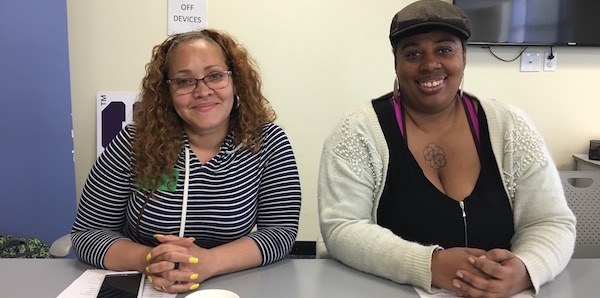
Nicole Goodwin, right, with Rise's Nancy Fortunato
It is as if my past has caught up with me: Deserted streets. Food lines. Curfews. Yes, I feel like my past has finally reared its ugly head on American soil.
I have been struggling daily since I returned from the war in Iraq 17 years ago. Secretly, I call these experiences “Living in a Triggering Town.” It’s the constant pressure of surviving.
That’s New York City today. Not being able to travel on the buses, or trains, or by cab. Normally. Not able to leave the house unless deemed mission essential by the Governor. Transit workers, grocery store workers, hospital personnel. They keep us alive, but they cannot keep us sane.
Before this quarantine, the last six months were a daily struggle for me to find some routine. Get out of bed. Go to the bathroom. Bring your phone. Play my YouTube playlist—just to motivate myself to get in the shower. Bathe, lotion up and change clothes. Avoid watching the news. Avoid being seen by other people. Avoid the cold. Avoid the pain on the inside. Ignore the pain in my back, legs, shoulders and neck. Avoid, avoid, avoid. Ignore, ignore, ignore.
Then, if I could, I would work on my art.
I work out of the anxiety that comes with not being able to live a “normal” life. Some days are good, and I am able to see friends and talk to loved ones. But there are days when my feelings overwhelm me. I am a castaway in the ocean. Drifting with the currents, under a grey sky. No land to be seen—and I am always alone.
On Day 3 or 4 of the Coronavirus lockdown, I looked outside my window and saw that the sun was shining. The leaves and flowers weren’t in bloom—yet—but birds were out in full force. I opened the window and felt the gust of cool air hit my skin and I felt alive and awakened. “Spring is coming in on the wind,” I thought, and I felt grateful.
We Harlemites are surrounded by so much quiet beauty as of late, while we are tucked inside our apartments. Some, like myself, are coming out only for the essential chores. Laundry, food shopping, small engagements of human contact while wearing face masks and latex gloves.
Others who roam in packs risk infection by carrying on as if its business as usual. Hugging, laughing, pretending that it’s just another day in the city. As dumb as that is, I can’t help but admire the bravery, the ability to spit in the eye of death, though the ordeal of contamination will be nothing less than cruel.
Yes, the fighter in me admires that stupidity a great deal. But I have a child, a 17-year-old home with me, who I love dearly. So as angry as I am, as helpless as I feel once again, I can’t afford to be stupid
Creatively, this pandemic has brought the best out of me. I am producing work left and right. The irony is that artists are deemed non-essential. Museums and galleries are shutting their doors. The lifeline that art has made been—not just for me, but for the world—has been cut by one word: necessity.
I will not lie; this is a dire situation for all of us. Today, when it was raining outside, I felt the loneliness. The need to see specific loved ones, to touch them, laugh and cry with them, like we once did only a month ago. The devastation when I hear the voicemail. Leave a message instead. Try to sound cheerful instead.
We can get through this. We can if we stick to the plan, we can if we stick together. I learned that while I was in the service, and it’s one of the few things that I learned that has worked.
Some of us have been struggling from catastrophe to catastrophe all our lives. Is this any different? Yes. Because, unlike any other catastrophe we’ve faced alone, we are all in this together. Needing each other, loving each other, getting on each other’s nerves, wishing we were alone, and, like me, wishing to be around each other again, for no special occasion other than to be together.
And that is the difference between now and the war I was in 17 years ago. Back then, I was surrounded by soldiers but I felt—I knew—they did not have my back. I had been sexually assaulted while in the military. I was alone.
Now, here I am in my Harlem apartment. My daughter is doing classwork. It’s just the two of us, yet we are among many fighting to live through this disaster, all on the same side. We—humanity—are all on the same team, running the same course, fighting the same enemy, shouting to the universe in one voice, saying: We want to live. We want to live. We want to live!
